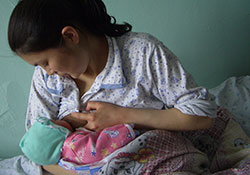European strategic approach for making pregnancy safer

WHO/Alberta Bacci
The European strategic approach for making pregnancy safer, developed by WHO/Europe in a consultative process, provides guidance to countries in developing or updating their policies and strategies to improve the health of mothers and babies. WHO workshops use this and other tools to support health system reform in this area.
WHO/Europe expert meetings and task forces endorsed the fundamentals and principles of the approach.
Fundamentals
- Care for pregnancy and childbirth calls for a holistic approach.
- Pregnancy and childbirth are an important personal, familial, and social experience.
- There should be no interference in the natural process of pregnancy and childbirth without a valid reason.
- Medical interventions for pregnant women, mothers and newborn babies, when indicated, need to be available, accessible, appropriate and safe.
Principles
Care should:
- be based on scientific evidence and cost-effective;
- be family centred and respect the confidentiality, privacy, culture, beliefs and emotional needs of women, families and communities;
- ensure the involvement of women in decision-making on care options and health policies; and
- ensure a continuum of care from communities to the highest level, including efficient regionalization and a multidisciplinary approach.
The role of mothers, families and communities
Improving health services for mothers and newborn babies and making them easily available does not necessarily mean they are used more. Coordinated efforts are needed to engage women, their babies’ fathers, families and communities as partners, and to increase their understanding of what mothers and newborn babies need.
Mothers, fathers, families and communities should be encouraged:
- to provide appropriate care and support in the home for the woman and the newborn;
- to seek appropriate care when needed for birth and for emergencies; and
- to assume their full role as partners in improving maternal and newborn health.
It is also important for countries to strengthen the relationship between health workers and women in their community, and to work with other sectors to improve health determinants such as education, water and sanitation, and transportation.



